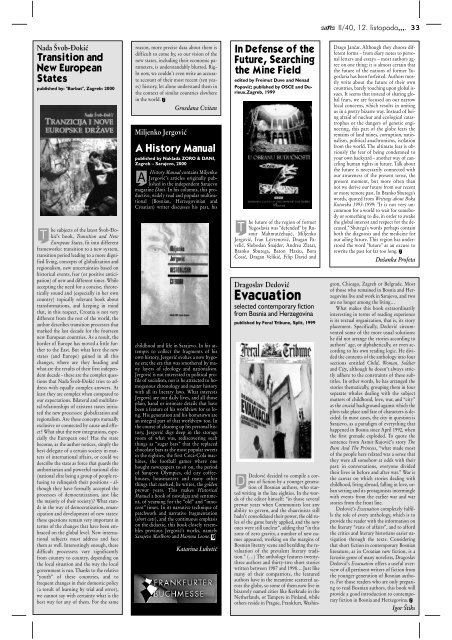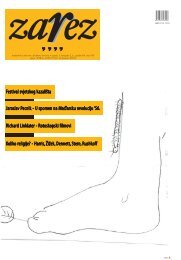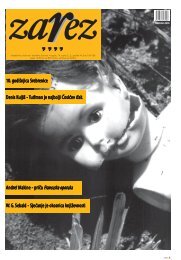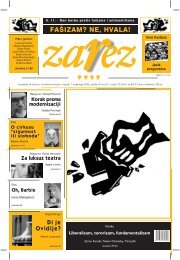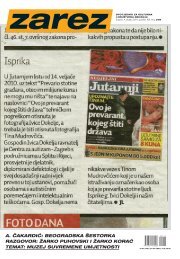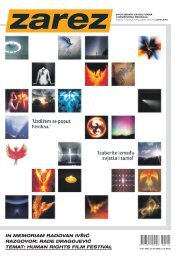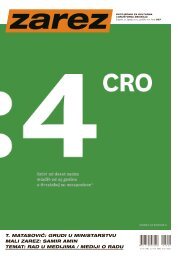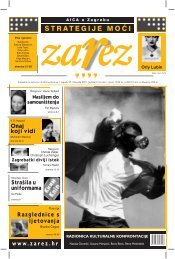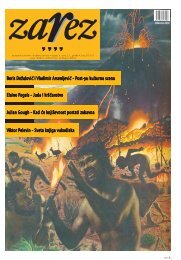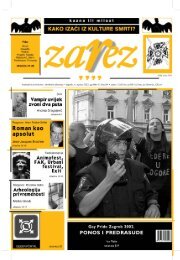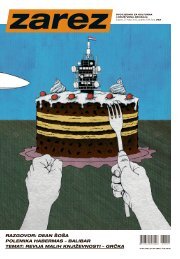32 II/40, 12. listopada 2,,,.eljko ZoricaH. C. ZabludovskyFantastical Bestiaryof Roskildepublished by Niska, Zagreb, 1999.he official, documented history ofthe town of Roskilde is not particularlyinteresting, or, to be moreprecise, not a bit more interesting thanthe history of so many small Europeantowns that take great pride in their oldchurches, castles, or archeological sites.What makes Roskilde interesting is its,for want of a better term, alternative history,that is, the history of its fantasticalcreatures. eljko Zorica set out to investigatethat history, with a little help fromZabludovsky…In the introduction, Zorica explains thestart of his cooperation with Zabludovskyin the late eighties. They agreed thatZabludovsky would “reveal secrets fromthe other side of life, from the parallelworlds”, and that Zorica would writethem down and adapt them, also takingcare of the publishing part. They wouldsign it as co-authors. A critic living atthe end of 20th century is used to all kindsof miracles, but accepting the factthat she has to review an author who inhabitssome parallel world is a little difficultto take…Although the title suggests the fantasticalbeasts of Roskilde, the creatures weencounter belong to a joint celestialworld of gods and animals. Thus wemeet brewer’s horses and Roskilde swansalongside gods from Nordic myths –Thor, Freya, Loki and others…. The tracesof gods were followed and celebratedby many poets, which is why we knowmore about gods than fantastical animals,although their diminishing traces arestill here - on façades, coats of arms,fountains and portals. Zorica has foundand described many slumbering Roskildebeings: swans, snakes, basilisks, trolls,griffins, even the Devil himself. Assistedby Zabludovsky, Zorica tells storiesof their origin and experiences, showinghow ties between people and fantasticalbeings were once much stronger thanthey are today. Façades of our houses,which are often made in concrete, withneon signs instead of guardians made instone, testify to that as well…Series ofphotographs, drawings, designs, andpaintings provided by the authors showthat fantastical beings on the old buildingsalso die, wiped out by the dictatesof modern construction, or else they disa<strong>pp</strong>earbeneath concrete and aggressivebillboards. Now the issue at stake istheir actual, final death, in this world andall parallel worlds – death by oblivion.… Zorica and Zabludovsky aim to showus that we live in illusions, that we toooften keep our eyes firmly glued to ourshoes, instead of looking up. Up wherebasilisks and griffins, stone angels andtwo-headed snakes are, and if we watchthem long enough, we will see entire citiesbehind them, cities that a<strong>pp</strong>ear soclose that we could reach out and touchthem with bare hands.Dušanka ProfetaBranko FuèiæTrifles/Fraškepublished by Kršæanska sadašnjost,Zagreb, 1999he title of Fuèiæ's book, Trifles/Fraške,is derived from oldGlagolitic jargon, where it stoodfor "trifles, worthless things, prattles,follies". We already met them in Fuèiæ'sprevious book, Terra Incognita, under theguise of "little" (h)istories about ordinarypeople, landscapes, customs and historicalmonuments of Istria and Kvarner. InFuèiæ's latest book, the author continuesto intermingle history and present times,travel books, biography and autobiography,documents and fiction, ethnographyand "little" histories. These are notcultural studies, nor could they be usedas teaching material, but Trifles/Fraškedoes have cultural and historical valuebecause it provides extraordinary andpersonal perspective... The book isexceptional in more ways than one: oneof the most interesting things about it isthe author's rare gift for writing. Althoughhe is mostly preoccupied with valuesof national importance – like Glagoliticwritings and medieval paintings in Croatia– Fuèiæ nevertheless succeeds in writingabout "trivial" and "unimportant"things" in an easy, simple and attractivemanner, showing both wit and intelligence.It only goes to prove that seriousscholarship can go hand in hand with havingfun and enjoying one’s work…Iva PlešeCD-ROMClassics of<strong>Croatian</strong> <strong>Literature</strong>II. (Poetry)published by Bulaja naklada, Zagreb,2000fter the pioneering CD editionClassics of <strong>Croatian</strong> <strong>Literature</strong> I(Epic poetry, Novel, Short stories),publishing group "Bulaja" continuestheir work on this second CD, whichcontains the most important works of<strong>Croatian</strong> poetry from the Middle Agesuntil the second half of the 20th century.Ivo MaroeviæZagreb WritesZagrebpublished byDurieux, Zagreb, 1999.published by Durieux, Zagreb 2000he book synthesizes all the mostimportant transformations of cityspace during history: from theinitial medieval cities to (post)socialisturban expansion. However, the scientificstyle has been replaced with the essayisticone, sometimes even with very pronouncedsubjective and emotional attitudes.Although he omitted the usual repertoireof footnotes, quotations andscholarly terms, and neglected detailedargumentation and verbal precision,Maroeviæ has managed to write anadequate and interesting text that can beread in one breath. It a<strong>pp</strong>ears, however,that the speed of reading matches thespeed with which it was written.Katarina LuketiæThe publisher has produced a representativereader of <strong>Croatian</strong> poetry, especiallyits older periods. Anthologies thatcould not be found in <strong>Croatian</strong> bookshopsfor decades, like Ranjina's Treasuryof Verse, are now easily accessible inelectronic form. The CD-ROM presentssome of the most ancient lyrical versesin Croatia, as well as the note on CvijetaZuzoriæ, the most celebrated woman in<strong>Croatian</strong> poetry. Every author is introducedwith exhaustive bibliographicalnotes, and his/her poetic work is accompaniedwith a dictionary where one canfind explanations of certain less familiarterms in the text. Besides the authoredverses, the CD contains anonymous oralpoetry as well. That is what makes thisCD, created by the most relevant <strong>Croatian</strong>philologists, a valuable critical edition,lyrical anthology and multimediahistory of <strong>Croatian</strong> poetry, all at the sametime.When compared with Classics of<strong>Croatian</strong> <strong>Literature</strong> I (Epic poetry, Novel,Short stories), the first CD-ROM inthe edition, the second one offers severalimportant improvements. First, the possibilityof browsing through the texts;secondly, the possibility of hearing someseventy-odd sound recordings of poetryreading, performed by Tomislav Rališand Joško ŠevoDean DudaMiljenko JergoviæYou Say Angelpublished by: "Durieux", 2000You Say Angel, the latest book by writerand essayist Miljenko Jergoviæ, boasts anunexpected subtitle – drama. It containsthirty-one dialogic scenes, which togethermake a single story about a life “in a newpart of town, born on the other side of theriver”. The story takes place in an easilyconceivable setting, a number of crampedapartments in a skyscraper. There are exactlyhundred characters, if I counted themright. A hundred faces, young and old, maleand female, with or without a name, whopresent small scenes from their ha<strong>pp</strong>y-unha<strong>pp</strong>ylives. Besides living in this universalskyscraper, the characters are also boundtogether by the fact that in every story, atleast one of the characters says angel. Thecharacters are not connected by plot andthey, of course, don’t know each other inthe space of reality. Although in Jergoviæ’sdramatical fiction they don’t come into directcontact with each other, the similaritiesand analogies are clearly recognizableto readers. Contrary to Tolstoy, Jergoviæcould say that all unha<strong>pp</strong>y families resembleone another. Or, alternatively: all familiesare both ha<strong>pp</strong>y and unha<strong>pp</strong>y, withouteven knowing it, or realizing why their livesproceed in a certain way.The narration in Jergoviæ’s previous bookshas always been marked by the inner voiceof the narrator, whether it was a voice ofthe characters or Jergoviæ’s voice. Whilethe voices in his stories always seemed autonomouswhen telling their stories, theywere always intertwined with Jergoviæ’sown voice – the voice of the narrator whoanalyzed them, entered them, who madecomments, pitied them or laughed withthem. Formally speaking, the dramatic discourseof You Say Angel cannot tolerateJergoviæ’s authorial voice. The only timehe a<strong>pp</strong>ears in the first person is in the prologueof the book, in a lovely miniature onlife in a big city, which also serves as themost accurate, and self-reflective review ofhis book. He writes: “Each part of thebook can function on its own, but it alsorelates to other parts, combining with differentparts into different wholes. The wayin which they combine, and how they areselected, depends only on the will of theperson who is making the selection and onhis/her divine need to choose a whole thatwill express some particular feeling.” Basedon this prologue, it is also easy to imagineJergoviæ building a complex dramaticskyscraper consisting of hundred facesthat represent the sadness and sorrow ofthe life we are living. Jergoviæ can rightlybe compared to Balzac and the way he minutelypainted and systematized an enormousbuilding that is his Human Comedy.Without any doubt, Jergoviæ’s dramaticgenre is a tragicomedy, farce, grotesque.These features are not new to his discourse,but they are more a<strong>pp</strong>arent in this dramaticform, where they cannot be concealedby the narrator’s gentleness or temperedby the slower rhythm of fiction. Grotesqueand comedy may naturally springfrom the scenes themselves, but tragic andfarcical tone is in line with the wayJergoviæ observes them.Andrea Zlatar
II/40, 12. listopada,,,. 33Nada Švob-ÐokiæTransition andNew EuropeanStatespublished by: "Barbat", Zagreb: 2000he subjects of the latest Švob-Ðokiæ'sbook, Transition and NewEuropean States, fit into differentframeworks: transition to a new system,transition period leading to a more dignifiedliving, concepts of globalization andregionalism, new uncertainties based onhistorical events, fear (or positive anticipation)of new and different times. Whileaccepting the need for a concise, theoreticallysound and (especially in her owncountry) topically relevant book abouttransformations, and keeping in mindthat, in this respect, Croatia is not verydifferent from the rest of the world, theauthor describes transition processes thatmarked the last decade for the fourteennew European countries. As a result, theborder of Europe has moved a little furtherto the East. But what have the newstates (and Europe) gained in all thischanges, where are they heading andwhat are the results of their first independentdecade - these are the complex questionsthat Nada Švob-Ðokiæ tries to addresswith equally complex answers. Atleast they are complex when compared toour expectations. Bilateral and multilateralrelationships of existent states initiatedthe new processes: globalization andregionalism. Are these concepts mutuallyexclusive or connected by cause and effect?What abut the new integrations, especiallythe European one? Has the statebecome, as the author notices, simply thebest delegate of a certain society in mattersof international affairs, or could wedescribe the state as force that guards theauthoritarian and powerful national elite(national elite being a group of people refusingto relinquish their positions - althoughthey have formally accepted theprocesses of democratization, just likethe majoriy of their society)? What standsin the way of democratization, emancipationand development of new states:these questions remain very important interms of the changes that have been embracedon the global level. New internationalsubjects must address and facethem as well. Interestingly enough, thesedifficult processess vary significantlyfrom country to country, depending onthe local situation and the way the localgovernment is run. Thanks to the relative“youth” of these countries, and tofrequent changes in their domestic policy(a result of learning by trial and error),we cannot say with certainty what is thebest way for any of them. For the samereason, more precise data about them isdifficult to come by, so our vision of thenew states, including their economic parameters,is understandably blurred. Rightnow, we couldn’t even write an accurateaccount of their most recent (ten years)history, let alone understand them inthe context of similar countries elswherein the world.Grozdana CvitanMiljenko JergoviæA History Manualpublished by Naklada ZORO & DANI,Zagreb – Sarajevo, 2000History Manual contains MiljenkoJergoviæ’s articles originally publishedin the independent Sarajevomagazine Dani. In his columns, this productive,widely read and popular multinational(Bosnian, Herzegovinian and<strong>Croatian</strong>) writer discusses his past, hischildhood and life in Sarajevo. In his attemptsto collect the fragments of hisown history, Jergoviæ evokes a now bygoneera; the era that was smothered by manylayers of ideology and nationalism.Jergoviæ is not interested in political profileof socialism, nor is he attracted to homogenouschronology and master historywith all its literary laws. What interestsJergoviæ are our daily lives, and all thoseplain, banal or intimate details that havebeen a feature of his worldview for so long.His generation and his hometown arean integral part of that worldview too. Inthe course of cleaning up his personal history,Jergoviæ digs deep in the storageroom of what was, rediscovering suchthings as “sugar bars” that the replacedchocolate bars as the most popular sweetsin the eighties, the first Coca-Cola machines,the football games where onebought newspapers to sit on, the periodof Sarajevo Olympics, old city coffeehouses,housmasters and many otherthings that marked, he writes, the goldenprewar years. This makes HistoricalManual a book of nostalgia and sentiment,of yearning for the “old” and “innocent”times. In its narrative technique ofpatchwork and narrative fragmentation(short cuts), and the continuous emphasison the didactic, this book closely resemblesprevious Jergoviæ's works, namelySarajevo Marlboro and Mamma Leone.Katarina LuketiæIn Defense of theFuture, Searchingthe Mine Fieldedited by Freimut Duve and NenadPopoviæ; published by OSCE and Durieux,Zagreb,1999he future of the region of formerYugoslavia was "defended" by RusmirMahmutæehajiæ, MiljenkoJergoviæ, Ivan Lovrenoviæ, Dragan Paveliæ,Slobodan Šnajder, Andrea Zlatar,Branko Sbutega, Baton Haxiu, BoraÆosiæ, Dragan Velikiæ, Filip David andDragoslav DedoviæEvacuationselected contemporary fictionfrom Bosnia and Herzegovinapublished by Feral Tribune, Split, 1999Drago Janèar. Although they choose differentforms – from diary notes to personalletters and essays – most authors agreeon one thing: it is almost certain thatthe future of the nations of former Yugoslaviahas been forfeited. Authors mostlywrite about the future of their owncountries, barely touching upon global issues.It seems that instead of sharing globalfears, we are focused on our narrowlocal concerns, which results in unitingus in a pretty bizarre way. Instead of beingafraid of nuclear and ecological catastrophesor the dangers of genetic engineering,this part of the globe fears theremains of land mines, corruption, nationalism,political anachronisms, isolationfrom the world. The ultimate fear is obviouslythe fear of being condemned toyour own backyard – another way of cancelinghuman rights in future. Talk aboutthe future is necessarily connected withour awareness of the present tense, thepresent moment, but more often thannot we derive our future from our recentor more remote past. In Branko Sbutega'swords, quoted from Writings about BokaKotorska 1993-1999: "It is not very uncommonfor a world to wait for somebodyor something to die, in order to awakethe global interest and respect for the deceased."Sbutega's words perhaps containboth the diagnosis and the medicine forour ailing future. This region has understoodthe word "future" as an excuse torewrite the past for far too long.Dušanka ProfetaDedoviæ decided to compile a corpusof fiction by a younger generationof Bosnian authors, who startedwriting in the late eighties. In the wordsof the editor himself: “in those severalprewar years when Communists lost anyability to govern, and the chauvinists stillhadn’t consolidated their power, the old rulesof the game barely a<strong>pp</strong>lied, and the newones were still unclear”, adding that “in thiszone of zero gravity, a number of new namesa<strong>pp</strong>eared, working on the margins ofBosnian literary scene and heralding the revaluationof the prevalent literary tradition.”(…) The anthology features twentythreeauthors and thirty-two short storieswritten between 1987 and 1998… Just likemany of their compatriots, the featuredauthors have in the meantime scattered acrossthe globe, so some of them now live inbizarrely named cities like Kerkrade in theNetherlands, or Tampere in Finland, whileothers reside in Prague, Frankfurt, Washington,Chicago, Zagreb or Belgrade. Mostof those who remained in Bosnia and Herzegovinalive and work in Sarajevo, and twoare no longer among the living…What makes this book extraordinarilyinteresting in terms of reading experienceis its textual organization, that is, its storyplacement. Specifically, Dedoviæ circumventedsome of the more usual solutions:he did not arrange the stories according toauthors’ age, or alphabetically, or even accordingto his own reading logic. He dividedthe contents of the anthology into foursections entitled Child, Woman, Soldierand City, although he doesn’t always strictlyadhere to the constraints of these subtitles.In other words, he has arranged thestories thematically, grouping them in fourseparate wholes dealing with the subjectmatters of childhood, love, war, and “city”as the crucial background against which theplots take place and fate of characters is decided.In most cases, the city in question isSarajevo, as a paradigm of everything thatha<strong>pp</strong>ened in Bosnia since April 1992, whenthe first grenade exploded. To quote thesentence from Asmir Kujoviæ’s story TheBum And The Princess, “what made mostof the people here related was a sense thatthey were all somehow at odds with theirpast: in conversations, everyone dividedtheir lives in before and after war.” War isthe canvas on which stories dealing withchildhood, living abroad, falling in love, urbansetting and its protagonists interminglewith events from the earlier war and warstories from the front line.Dedoviæ’s Evacuation completely fulfillsthe role of every anthology, which is toprovide the reader with the information onthe literary “state of affairs”, and to affordthe critics and literary historians easier navigationthrough the texts. Consideringthat short fiction in contemporary Bosnianliterature, as in <strong>Croatian</strong> new fiction, is afavorite genre of many novelists, DragoslavDedoviæ’s Evacuation offers a useful overviewof all pertinent writers of fiction fromthe younger generation of Bosnian authors.For those readers who are only preparingto read Bosnian authors, this book willprovide a good introduction to contemporaryfiction in Bosnia and Herzegovina.Igor Štiks
- Page 2 and 3: 2 II/40, 12. listopada 2,,,.gdje je
- Page 4 and 5: 4 II/40, 12. listopada 2,,,.Davorka
- Page 6 and 7: 6 II/40, 12. listopada 2,,,.Nakladn
- Page 8 and 9: 8 II/40, 12. listopada 2,,,.Andrea
- Page 10 and 11: 10 II/40, 12. listopada 2,,,.Pjesni
- Page 12 and 13: 12 II/40, 12. listopada 2,,,.U uvod
- Page 14 and 15: 14 II/40, 12. listopada 2,,,.Irena
- Page 16 and 17: 16 II/40, 12. listopada 2,,,.o you
- Page 18 and 19: 18 II/40, 12. listopada 2,,,.n her
- Page 20 and 21: 20 II/40, 12. listopada 2,,,.In you
- Page 22 and 23: 22 II/40, 12. listopada 2,,,.Roman
- Page 24 and 25: 24 II/40, 12. listopada 2,,,.Miljen
- Page 26 and 27: 26 II/40, 12. listopada 2,,,.Sonja
- Page 28 and 29: 28 II/40, 12. listopada 2,,,.Marink
- Page 30 and 31: 30 II/40, 12. listopada 2,,,.Igor M
- Page 34 and 35: 34 II/40, 12. listopada 2,,,.FRAKCI
- Page 36 and 37: 36 II/40, 12. listopada 2,,,.Miljen
- Page 38 and 39: 38 II/40, 12. listopada 2,,,.Sonia
- Page 40 and 41: 40 II/40, 12. listopada 2,,,.Marink
- Page 42 and 43: 42 II/40, 12. listopada 2,,,.Igor M
- Page 44 and 45: 44 II/40, 12. listopada 2,,,.eljko
- Page 46 and 47: 46 II/40, 12. listopada 2,,,.Frakci
- Page 48: 48 II/40, 12. listopada 2,,,.Hrvoje


